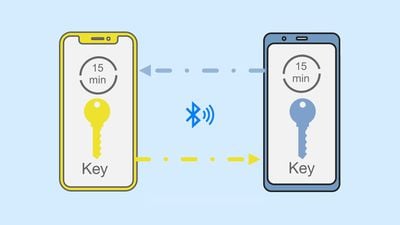England is developing a contact tracing app that uses Apple and Google's Exposure Notification API, and while there are still bugs to be worked out, it's set to be trialed in a few areas in the country starting tomorrow.

According to the BBC, the app will be trialed on the Isle of Wight and in one other area with a volunteer group. The experiment is being launched quietly as there's no word on when a formal national rollout might happen.
Even as the app enters a trial period, engineers are struggling to address a problem with Bluetooth distance calculations. Apparently the app wrongly flags people of being within 6.6 feet of one another when they're not, which could lead to people quarantining when they don't need to.
Apple and Google do not provide raw Bluetooth signal strength data to app developers to better protect user privacy. Multiple countries have asked for relaxed restrictions.
Part of the problem with the Apple-Google framework is that the tech firms have decided that developers should not get access to raw attenuation data - a measure of changes in Bluetooth signal strength.
Instead, it provides a more basic set of readings that an app can use to calculate its own risk scores - the idea being that this helps preserve users' anonymity.
But one consequence of this, is that engineers have not been able to take advantage of a technique developed by researchers at the UK's Turing Institute and the University of Oxford. It filters the data to give a better indication of proximity.
England's app engineers are hoping to be able to improve accuracy to a degree that will be usable by the end of the year.
As with other Exposure Notification solutions, the app will use Bluetooth to determine when two people come into contact with one another to track possible coronavirus exposures. If a person is diagnosed with COVID-19, the app allows them to notify all of the people they've been in contact with, cutting down on the spread of the virus.
The app England is developing will also ask users to scan a QR code when entering properties as a way to later alert them if they've visited a location linked to multiple infections.
The UK did not initially plan to use Apple and Google's Exposure Notification API and was instead pursuing a different approach, but a June report suggested the National Health Service had changed its mind and was working on an app using the Apple/Google API.
The original app was hobbled by restrictions that Apple imposes on Bluetooth apps, which would have prevented an app that doesn't use the Exposure Notification API from accessing Bluetooth in the background. Because Bluetooth was not continually available, the app that was initially in development only detected four percent of iPhones in situations where the app was asleep and the two devices involved had not been recently used.
Note: Due to the political or social nature of the discussion regarding this topic, the discussion thread is located in our Political News forum. All forum members and site visitors are welcome to read and follow the thread, but posting is limited to forum members with at least 100 posts.
























